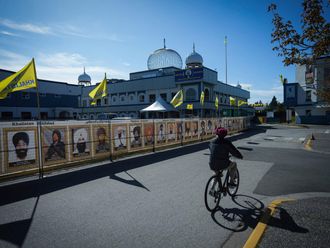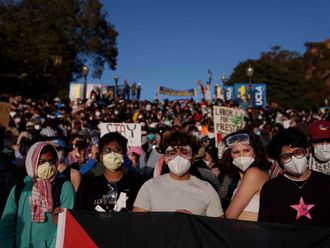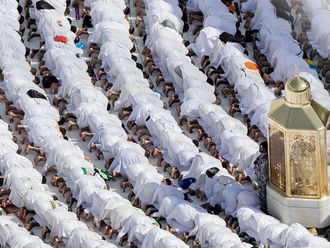Mexico: US President Barack Obama will embark on what may be a treacherous presidential relationship with Russian President Vladimir Putin on Monday, as rising antagonism, especially over Syria, clouds reset US ties with Moscow.
Obama will face off with Putin for the first time since the former KGB man’s return to the Kremlin in closely watched and delicate talks ahead of the G20 summit in the Mexican resort of Los Cabos.
The US leader sees the “reset” of relations with Russia — engineered with ex-president Dmitry Medvedev — as a foreign policy highlight that has yielded a START nuclear arms treaty and cooperation on Iran and Afghanistan.
But angry exchanges over Syria, Putin’s prickly approach and political turbulence in both Moscow and Washington appear to be driving the relationship between two former Cold War foes towards open confrontation.
So Monday’s meeting is a chance more to head off a serious rupture than to chase breakthroughs.
Matthew Rojansky of the Carnegie Endowment for International Peace said Putin and Obama should perform “damage control” and establish an understanding so current tensions do not boil over.
“I think that what they can do is kind of have a meeting of the minds and maybe a little bit of anticipatory strategising politically on what happens if some undesirable thing happens,” he said.
Facing a tough re-election fight, Obama has little room for manoeuvre.
He was famously caught on an open mic in Seoul in March asking Medvedev to tell Putin he would have more flexibility on a US missile defence scheme, which Moscow fiercely opposes, after November’s election.
Obama also needs to protect his political flank: his Republican foe Mitt Romney has branded Russia a geopolitical threat.
“President Obama’s ‘reset’ policy toward Russia has clearly failed,” Romney said last week.
“Russia has openly armed and protected a murderous regime in Syria, frustrated international sanctions on Iran, and opposed American efforts on a range of issues.
“This is an unfortunate failure of President Obama’s foreign policy.”
Washington still hopes Russia will eventually help ease the crisis in Syria, though is increasingly impatient over its refusal to permit the UN Security Council to mastermind President Bashar Al Assad’s ouster.
Secretary of State Hillary Clinton last week accused Moscow of supplying attack helicopters to Al Assad. An angry Russia said it had merely repaired Syria’s existing aircraft.
Analysts say Russia feels burnt after getting assurances from the West last year that regime change was not on the agenda in Libya, only for Western warplanes to help the opposition topple Muammar Gaddafi.
Moscow also fears losing a key geopolitical ally, and naval bases with access to the eastern Mediterranean, should Al Assad’s brutal regime fall, and be replaced by a government less sympathetic to Moscow.
The White House, seeking Russian acquiescence in a Yemen-like power transfer, made clear Friday it did not seek to end Russian interests in Syria.
When Obama and Putin meet, the US leader may feel a touch of nostalgia for the friendly summits and hamburger lunch he once enjoyed with Medvedev.
But US officials insist the “reset” was based on interests not personalities.
They also argue that Putin, as a power behind his predecessor’s throne, signed off on key aspects of US-Russian relations.
“In the initial phone calls that President Obama has had with President Putin, the indication that we’ve given and that the Russians have provided is that [they] want to continue to build on the common ground that we’ve had,” said Ben Rhodes, a US deputy national security adviser.
Yet Putin, who jealously guards Russia’s “great power status” has made no secret of his suspicions of the United States, blaming Washington for organising anti-government protests in Moscow last year.
The Russian leader, citing the need to form a cabinet, declined to attend the G8 summit that Obama hosted last month.
Though US officials denied his no-show was a snub, Putin has since shown up in Beijing, Berlin and Paris, perhaps hinting where his priorities lie.
Analysts say that when Obama and Putin met in 2009, the then Russian prime minister delivered a tirade against Washington.
So the tone of their interactions before reporters Monday will be closely watched.
As well as taking heat from Romney, Obama is also under pressure from Congress, after asking lawmakers to lift a Cold War measure limiting Russia’s trade privileges known as the Jackson Vanik waiver, as Moscow enters the World Trade Organisation.
Instead, rebellious lawmakers are pushing legislation that would sanction some Russian officials over the death in jail of Sergei Magnitsky, which Moscow has branded anti-Russian.












